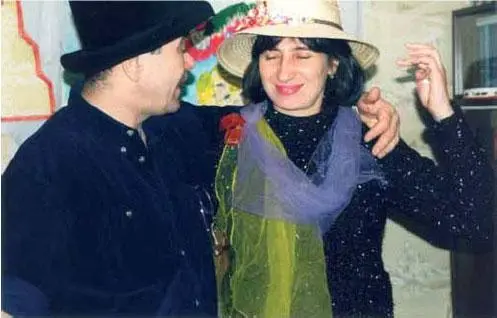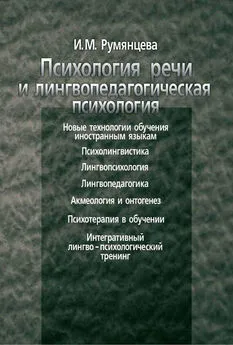Ирина Румянцева - Психология речи и лингвопедагогическая психология
- Название:Психология речи и лингвопедагогическая психология
- Автор:
- Жанр:
- Издательство:Литагент «Когито-Центр»881f530e-013a-102c-99a2-0288a49f2f10
- Год:2004
- Город:Москва
- ISBN:5-9292-0121-8, 5-94010-320-0
- Рейтинг:
- Избранное:Добавить в избранное
-
Отзывы:
-
Ваша оценка:
Ирина Румянцева - Психология речи и лингвопедагогическая психология краткое содержание
Книга представляет современные научные воззрения в области природы, формирования и развития речи, объединяя сферы лингвистики, психологии, педагогики.
В ней предлагаются новые технологии обучения иностранным языкам взрослых людей, в том числе тех, кто имеет негативный опыт овладения языками или приступает к их изучению впервые.
Особое место в книге отведено Интегративному лингво-психологическому тренингу (ИЛПТ) как методологической основе обучения иноязычной речи. Раскрываются научные принципы и прикладные аспекты ИЛПТ с целью использования данного метода в педагогической практике.
Книга предназначена для студентов высших учебных заведений, получающих образование по филологическим, психологическим и педагогическим специальностям. Она может быть полезной широкому кругу ученых и практиков, чьи интересы и деятельность связаны с лингвистикой, психологией, педагогикой, преподаванием иностранных языков.
Психология речи и лингвопедагогическая психология - читать онлайн бесплатно ознакомительный отрывок
Интервал:
Закладка:
512. Якобсон Роман. Избранные работы. М., 1985.
513. Ялом Ирвин. Теория и практика групповой психотерапии. СПб., 2000.
514. Aitchison J. Words in the Mind. Oxford, 1994.
515. Arnold Roslyn. Writing Development. Magic in the Brain. Milton Keynes-Philadelphia: Open University Press, 1991.
516. Bastine R., Kommer D. Konfrontation als Strategie therapeutischen Handels / Hrsg. L. H. Eckensberger: Bericht uber 31 Kongress…, 1978. B. 2.
517. Building Moral Communities Through Educational Drama / Ed. by B. J. Wagner. Portland, Maine: Calendar Islands Publishers, 2000.
518. Caine Geoffrey, Caine Renate Nummela, Crowell Sam. Mindshifts. A Brain Based Process for Restructuring Schools and Renewing Education. Tucson, Arizona: Zephyr Press, 1994.
519. Cattel R. B. Abilities: their structure, growth and action. Boston: Houghton Mifflin company, 1971.
520. Charlston B. M. Studies on the Emotional and Affective Means of Expression in Modern English. Bern, 1960.
521. Chomsky N. Aspects of Theory of Syntax. Cambridge, Mass., 1965.
522. Courtney Richard. A Lifetime of Drama Teaching and Research // Building Moral Communities Through Educational Drama / Ed. by B. J. Wagner. Portland, Maine: Calendar Islands Pub., 2000.
523. Damasio Antonio. The Feeling of What Happens: Body and Emotion in the Making of Consciousness. London: William Heinemann, 1999.
524. Ervin-Tripp S. M., Slobin D. I. Psycholinguistics // Annual Review of Psychology, 1966. V. 17.
525. Expression of the Emotions / Ed. by Knapp P. H. New York: Academic Press, 1963.
526. Freud S. The Major Works of Sigmund Freud. Chicago; London; Toronto, 1952.
527. Gardner Howard. Frames of Mind. The Theory of Multiple Intelligences. London: Fontana Press, 1993.
528. Green Maxine. Releasing the Imagination. Essays on Education, the Arts, and Social Change. San Francisco: Jossey-Bass Publishers, 1995.
529. Goleman Daniel. Emotional Intelligence. New York: Bantam Books, 1995.
530. Hume Karen, Wells Gordon. Making Lives Meaningful: Extending Perspectives Through Role Play // Building Moral Communities Through Educational Drama / Ed. by B. J. Wagner. Portland, Maine: Calendar Islands Pub., 2000.
531. Jensen Eric. Brain-Based Learning. USA: Brain Store Inc., 2000.
532. Jensen Eric. Brain-Based Learning & Teaching. Del Mar, CA, USA: Turning Point Publishing, 1995.
533. Jensen Eric. Teaching with the Brain in Mind. Alexandria, Virginia, USA: Association for Supervision & Curriculum Development, 1998.
534. Lewin K. A Dynamic Theory of Personality. New York: McGraw Hill, 1935.
535. Mc Neill D. The Acquistition of Language. New York, 1970.
536. Minsky M. The Society of Mind. New York; London, 1986.
537. Moreno J. Group Method and Group Psychotherapy. New York, 1932.
538. Nadel L. Modern Methods of Investigation in Speech Production // Phonetica, 1980. Vol. 37 (1–2).
539. Norris Joe. Creative Drama as Adults’ Work // Building Moral Communities Through Educational Drama / Ed. by B. J. Wagner. Portland, Maine: Calendar Islands Pub., 2000.
540. Ojeda A. Linguistic Individuals. Stanford, 1993.
541. Pinker Steven. Language Learnability and Language Development. Harvard University Press, Cambridge, Mass. & London (England), 1996.
542. Rapaport D. On the psychoanalytic theory of affects // International Journal of Psychoanalysis, 1953. V. 34.
543. Rapaport D. On the psychoanalytic theory of motivation // In: M. R. Jones (Ed.). Nebraska Symposium of Motivation. Lincoln, NE, University of Nebraska Press, 1960.
544. Reber Arthur S. The Penguin Dictionary of Psychology. London: Penguin Books, 1995.
545. Reich W. Character analysis. New York: Farrar, Straus & Giroux, 1942.
546. Rumyantseva I. M. From Heart to Mind: How Some Russian Adolescents Enter the World of English // «KAMLE Karavan», Journal of the Kansas Association for Middle Level Education, 1997. V. 10.
547. Rumyantseva I. M. Hindi Word Prosody // Indian Journal of Linguistics. Linguistic Studies in the USSR. Calcutta, 1988.
548. Silberman Mel. Active Learning: 101 Strategies to Teach Any Subject. USA: Allyn & Bacon, 1996.
549. Silberman Mel. Peoplesmart: Developing Your Interpersonal Intelligence. USA: Berret-Kochler Pub., 2000.
550. Silberman Mel, Lawson Karen. 101 Ways to Make Learning Active. USA: Pfeiffer & Co, 1995.
551. Skinner B. F. Science and Human Behavior. New York, 1953.
552. Smagorinsky Peter. The World is a Stage: Dramatic Enactment as Response to Literature // Building Moral Communities Through Educational Drama / Ed. by B. J. Wagner. Portland, Maine: Calendar Islands Pub., 2000.
553. Sonderegger Theo. Psychology. Lincoln, Nebraska: Cliffs Notes, Inc., 1998.
554. Sullivan H. S. The interpersonal Theory of Psychiatry. New York: W. W. Norton & Co., 1953.
555. Vandryes J. L’oeuvre linguistique de Charles Bally. // Cahiers F. de Saussure, VI, Geneve, 1947.
556. Wagner Betty Jane. Dorothy Heathcote: Drama as a Learning Medium / With a foreword by Cecily O’Neill. Rev. ed. Portland, Maine: Calendar Islands Publishers, 1999.
557. Watson J. Behaviorism. Chicago, 1930.
558. Weber Ann L. Introduction to Psychology. New York: Harper Perennial, 1991.
559. Wittig Arno F. Theory and Problems of Introduction to Psychology. New York: McGraw-Hill, 2001.
Irina M. Rumyantseva
Psychology of Language and Language Teaching
This book shares the author’s long time experience in teaching foreign languages by a special psycholinguistic method, which unlocks the whole mental and creative potential of a personality and facilitates absorption of a large amount of language material most effectively, in a short period of time and in a light, interesting and easy manner.
This method is based on the author’s psycholinguistic and psychological research, revealing language and speech mechanisms, and combines the achievements of linguistics, psychology and pedagogy. It can be effectively adopted for the work with adults, adolescents and children.
The results of the method seem incredible: in less than 100 hours (12 hours per week, 8 weeks) students manage to learn 3–5 thousand words and the whole normative Grammar starting as beginners.
At the basis of this innovative method lies the author’s integrative theory of speech, according to which speech is described from different angles. Taking into consideration that speech means language in action and that is not only a linguistic code but also a psychic and brain process, a special human activity and behavior, the author offers for the purpose of language acquisition and teaching a special psycholinguistic training (Integrative Linguistic & Psychological Training – ILPT).
This training involves a system of exercises and games which help to unblock emotions and feelings; to stimulate cognitive processes (perception, attention, memory, thinking, imagination); to relieve mental tension and overcome communicative barriers; to develop a better understanding of oneself and other people; to muster all means of interpersonal communication (mime, gesture, pose, intonation); and, finally, to create possibilities for self-expression in a foreign language.
To tap all the reserves of a personality, hidden in unrealized mental activity, the author uses as the basis of this training different interdisciplinary approaches: psychogymnastics, music and art therapy, drama techniques, literature and even dance.
The author believes that the harmony of music and rhyme, of colors and forms, of feelings and emotions, can find a shorter way to a human heart and mind than the logic of facts, reasons and rules.
A variety of games and exercises, which stimulate and develop linguistic, brain and psychic processes are shared with the reader in this book. That is why the book might be of interest to all enthusiasts of language study: to teachers, linguists and psychologists.
ИЛПТ в лицах


Фото 1 u 2. «Встреча участников конгресса «Гринпис в аэропорту «Шереметьево». Фотографии демонстрируют первые шаги участников тренинга по вступлению в контакт и развитию в себе ощущения принадлежности к группе. С целью научиться владеть невербальными средствами общения (своим телом и мимикой) ученики работают «с пустышкой», т. е. без применения реквизита и иных подручных средств. Красочные плакаты, а также звучащая музыка помогают создать иноязычную речевую среду и атмосферу веселого учебного праздника.

Фото 3. «Говорящий поезд».

Фото 4. «Приглашение к диалогу».
Прикосновения друг к другу, (ощупывание» тела и рук партнеров, ощущение их тепла – непременное условие для преодоления бастионов психологической защиты, тревожности и страхов участников тренинга, для рождения чувства доверия к партнерам и доброй улыбки.

Фото 5. «Летящая квадрига на фасаде Большого театра».

Фото 6. «Говорящий вертолет».
Речь формируется в движении, в атмосфере радостных эмоции и чувств: для развития речи необходима тренировка не только органов артикуляции, но и всех мышц тела на фоне положительных эмоций. Все это доступно не только молодым, но и пожилым участникам тренинга.
Читать дальшеИнтервал:
Закладка:










